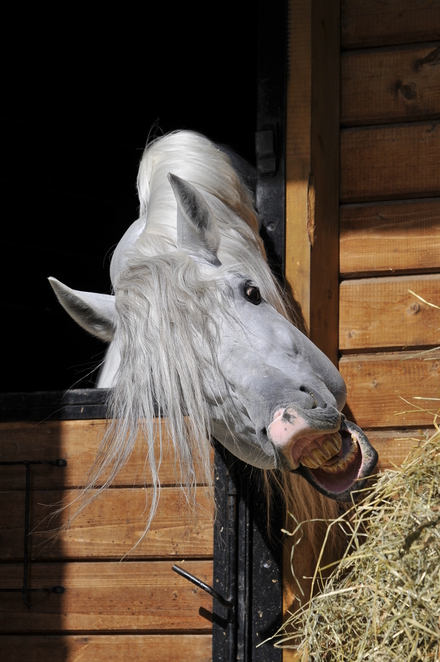Digestive disorders, including colic and choking, rank among the top 10 emergencies faced by horse owners, according to research published in 2010 by the Mississippi State University Extension Service in its MSU CARES (Coordinated Access to the Research and Extension System) newsletter.

Protecting your horse from gobbling its feed
When the stakes are as high as your horse's health, pasture and stall “toys” like the Nose-It!® that encourage slow feeding, are about more than fun and games.
“Esophageal obstruction (choke),” said veterinarians Ann Rashmir-Raven, DVM, MS, Diplomate, ACVS, and Richard M. Hopper, DVM, ACT, “is caused by a variety of factors, mostly eating too quickly, eating rough or bulky feed stuff, or having esophageal lesions already. Poor teeth can cause choke if the horse is unable to chew food properly.
When the stakes are as high as your horse's health, pasture and stall “toys” like the Nose-It!® that encourage slow feeding, are about more than fun and games. They can offer better digestive and psychological options.
In December 2012, Elizabeth Carr, DVM, PhD, Dipl. ACVIM, Dipl. ACVECC, of the College of Veterinary Medicine at Michigan State University, told The Equinist blogger, Susan Kauffman: “I like the slow feeding concept because it mimics natural grazing, It gives horses something to do for a longer period of time."
"I think the psychological benefits are obvious, because eating is what horses like to do. Another good aspect of using slow feeders is that they may make group feeding easier.
If you group feed loose hay, you get one horse who inhales it and another that doesn’t get enough. Slow feeders force an easy keeper to eat more slowly and give others a chance.”
Tracee Beebe, of Sunrise Horse Rescue, saw that domino effect firsthand: “With the rising cost and diminishing nutritional value of hay, we decided to switch our rescue horses to pelleted feed. They loved this idea but it came with a big problem.
They gobbled up the pellets and were looking for more in 20 minutes. This led to boredom, which led to destructive behavior. Most of the horses turned into 'termites,' chewing the barn to pieces. We tried all the products to discourage this behavior but nothing worked until I found Nose-It!® on Google."
"I bought two and would have bought more but wanted to be sure they worked. Boy, did they! I gave two red Nose-It®s to my worse chewer, it slowed their gulping feed and entertained them through the day.”
In all situations, veterinarians say the best treatment against choking and digestive emergencies is prevention. In addition to a sound health program and close working relationship with your veterinarian to help decrease the incidence and severity of emergencies, a slow feeding aid like Nose-It!® can help turn safer nutrition, better attuned to the equine digestive rhythm, into horse play.
Nose-It!® Slow Feeder and Treat Dispensing Balls are now available in 8” and 10” Flat Fill or Funnel Fill in Blue, Red, Yellow or Purple color choices.
The Nose-It!® 10” Funnel Fill works well with hay cubes and larger treats while the Nose-It!® 8” and 10” Flat Fill are excellent for all types of treats and pelleted feed.
Nose-It!® is now available through RS Bioceuticals, whose motto, "Innovation thru Collaboration,™" recognizes the value and importance of relationships and allows us to use our manufacturing, marketing, sales, distribution and product development experience to solve critical business challenges and build successful product and brand solutions. To learn more call 877-288-1760.
